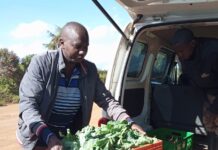By Lenah Bosibori
Nairobi, Kenya: As the Climate Summit (ACS) kicked off in Nairobi Kenya under the theme, ‘Driving Green Growth and Climate Finance For Africa’s Solutions,’ discussions on food systems transformation in Africa took to the center stage to showcase how Ethiopia has moved from a net importer of wheat to a stable country.
Speaking during the side event on investment opportunities for food systems transformation in Africa, Dr Ibrahim Mayaki African Union Special Envoy for food systems said that with the right investments and policies, Africa can become a vibrant, sustainable, and prosperous engine of economic growth.
“Our journey in Ethiopia began with the commitment to modernize agriculture by recognizing that the smallholder farmers form the backbone of our economy,” added Mayaki.
“We also became aware that agricultural productivity could not be achieved until the natural resources base becomes better managed and protected,” added Mayaki.
According to Mayaki, through technology, scientific research, and development, Ethiopia is no longer importing wheat.
Mayaki, who is also the former Prime Minister of Ethiopia said that Africa is performing worse than the global average on food and agriculture.

“There are approximately 280 million Africans undernourished and Africa uses 50 billion dollars annually to import food,'” said Mayaki.
He added that Africa ranks poorly in vulnerability, agriculture productivity, nutrition, and health.
He gave an example that has so far improved the agriculture system in Ethiopia.
“We launched a large-scale scheme on integrated watershed management mainly by mobilizing and encouraging the people to protect the landscape,” said Mayaki.
“We also worked on policies that promote value addition and agribusiness development, we encouraged the growth of agriculture processing industries and established agro-processing in our major regions,” added Mayaki.
Mayaki reiterates that for Africa to truly transform agriculture it needs to invest in critical agriculture including rural roads, irrigation schemes, and post-harvest storage facilities. “No country stands alone, the launch of the Comprehensive Africa Agriculture Development Program has also enabled us to set clear targets” added Mayaki.
“Investment in trade will enhance food productivity and the region’s competitiveness with the right investments and policies. We can turn Africa’s Agriculture and food sector into a vibrant, sustainable, and prosperous engine of economic growth, but to achieve this we need an investment plan and regular policy adjustment. We believe that Africa can feed itself” said Mayaki.
To echo the Sentiments of Dr. Mayaki, Kwabena Tufuor the team leader PROSECT program in Ghana showcased his start-up that is benefiting 15 farmers in Ghana who are generating cash from a waste-for-cash program that started three years ago.
Tufuor spoke during a side event in the ongoing summit dubbed ‘Driving Green Growth and Climate Finance, Solutions for Africa and the World.
“My startup is a solution based geared towards harnessing organic waste streams, insect technology using the larvae of the black soldier fly,” said Tufuor.
He adds that it is an organic waste stream that produces low-cost but high-quality alternative protein feed substitutes for local poultry, fishermen, and pig farmers with the aim of saving up to 30 percent on feed costs.
“We also produce a by-product during our production process that is used as organic fertilizer which is all in line with the United Nations sustainable development goal one of no poverty, goal number two of zero hunger, and goal 13 of climate action,” adds Tufuor.
Lack of access to finance for smallholder farmers has been a challenge but Tufuor has ventured to his innovation to provide farmers with cash by selling waste that is later income of around $ 100-150 dollars a month.

He says that he ventures on poultry, fish, and pig farmers because they are the most impacted when it comes to high feed costs.
“We have been able to reach a milestone of one tonne of larvae every month from women-led smallholder farmers, we want to ensure that these women are able to earn extra income in their households,” said Tufuor.
The three-year start-up has won three sponsorships since its inception.” Covid-19 amplified the plight of these farmers and gave us more energy to roll out this as soon as possible,” adds Tufuor.














